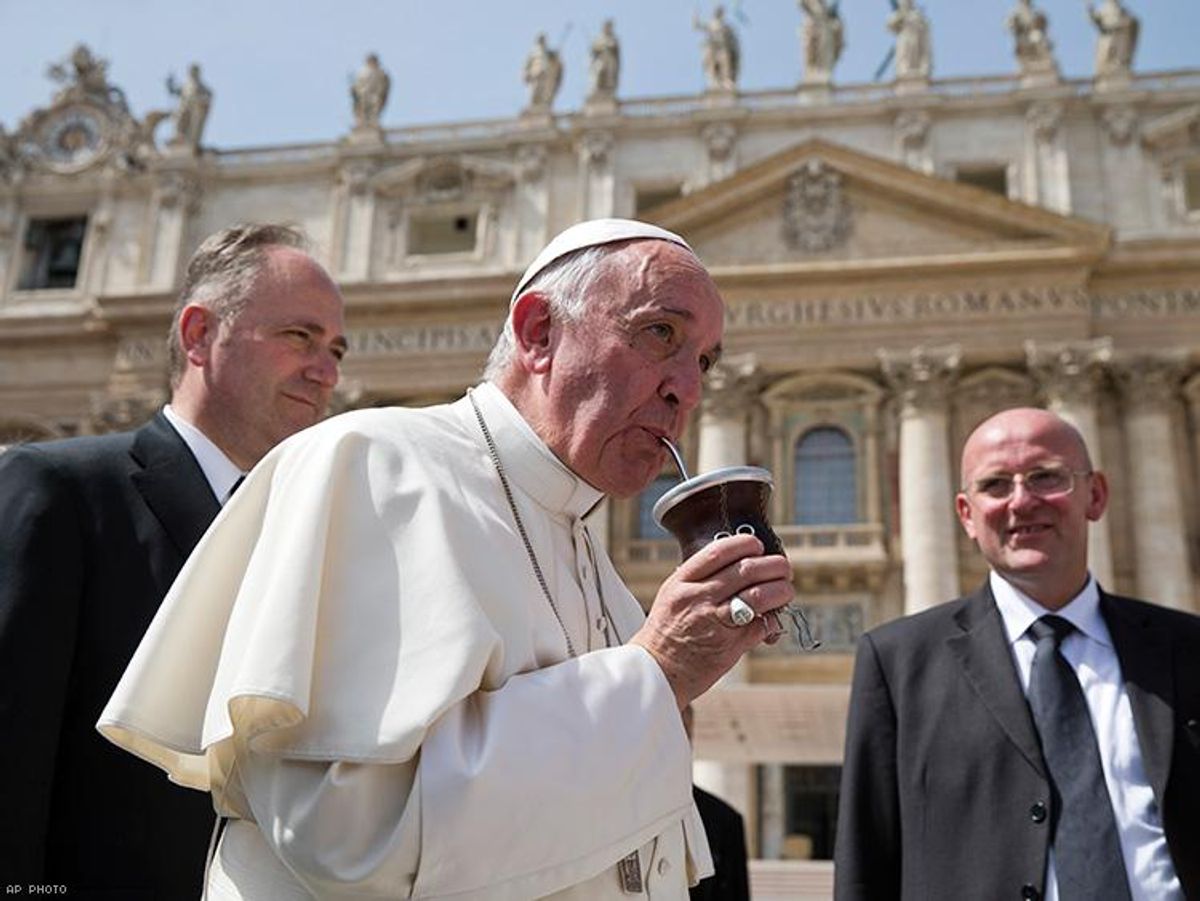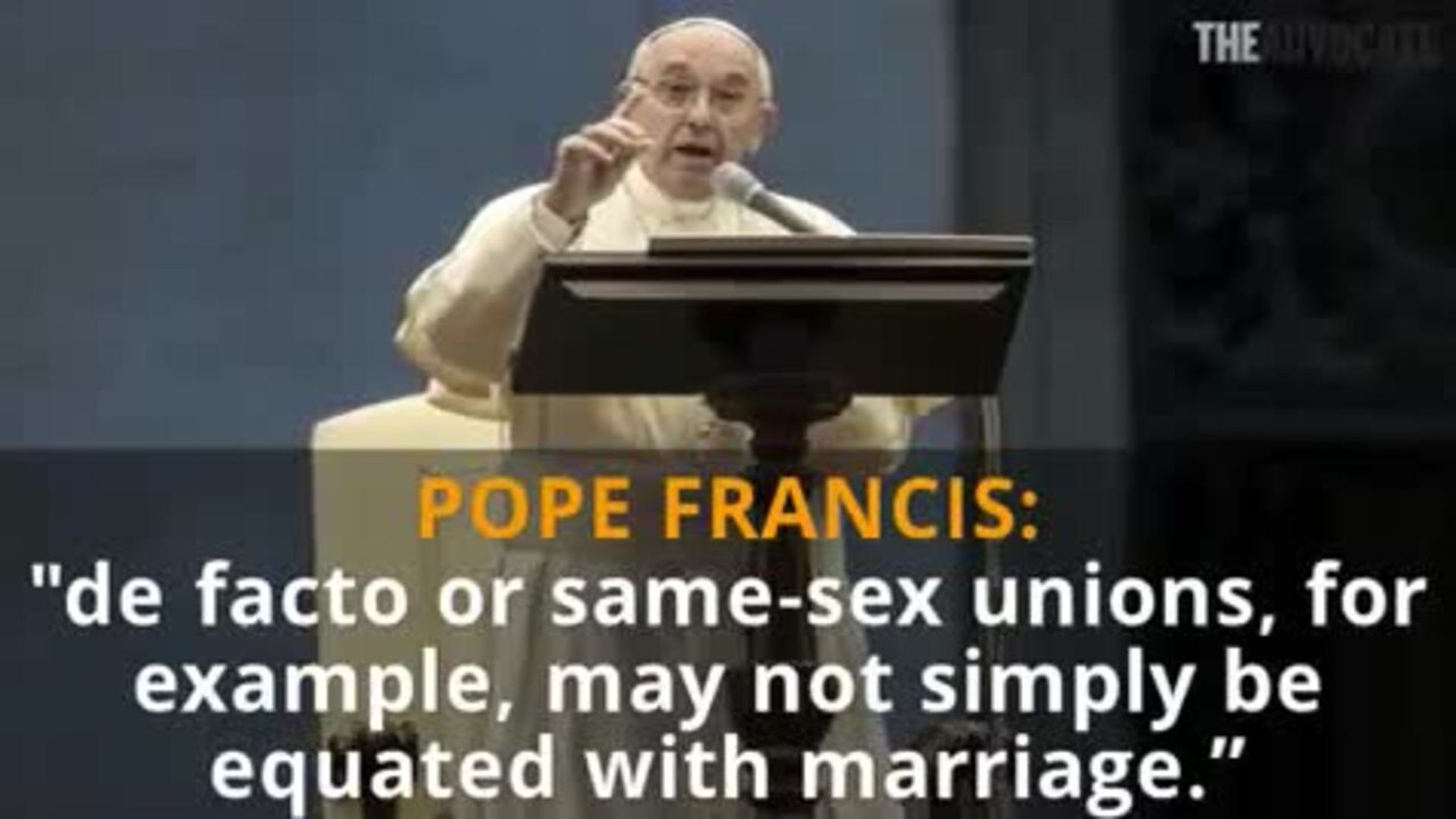LGBT Catholics are expressing great disappointment with Pope Francis's long-awaited document on marriage and family issues, The Joy of Love, released today.
The document reaffirms the Roman Catholic Church's opposition to same-sex relationships, saying these can never be considered the equal of heterosexual marriage. It draws on a report out of a bishops' synod, or meeting, held in two parts over the past two years to discuss marriage and family.
Modern society, the pope writes, has devalued marriage. "There is a failure to realize that only the exclusive and indissoluble union between a man and a woman has a plenary role to play in society as a stable commitment that bears fruit in new life," the pope says. "We need to acknowledge the great variety of family situations that can offer a certain stability, but de facto or same-sex unions, for example, may not simply be equated with marriage."
He cites a quote from the bishops' report, saying, "There are absolutely no grounds for considering homosexual unions to be in any way similar remotely analogous to God's plan for marriage and family."
He calls, as the church has previously, for avoidance of "unjust discrimination" based on sexual orientation, and says families in which a member experiences "same-sex attraction," as the pope puts it, "should be given respectful pastoral guidance, so that those who manifest a homosexual orientation can receive the assistance they need to understand and fully carry out God's will in their lives." From the church's viewpoint, "God's will" means they should not act on such attractions.
He also calls for the church to be more welcoming to those living in "irregular situations," which appears to include LGBT people, cohabiting but unmarried straight couples, single parents, and divorced people.
Francis asserts that gender is inseparable from biology, again quoting the bishops' report, which denounces any ideologies "that promote a personal identity and emotional intimacy radically separated from the biological difference between male and female" and in which "human identity becomes the choice of the individual, one which can also change over time."
The document was a great disappointment to LGBT Catholics, coming from the pope who famously said "Who am I to judge?" regarding gay priests. "Instead of listening to more progressive voices at the synods who called for greater understanding and dialogue with the LGBT community, the pope simply repeated church condemnations of same-sex unions, adoption by lesbian and gay people, and the complexities of gender identity," said a statement issued by Francis DeBernardo, executive director of New Ways Ministry, a group that advocates for LGBT equality within the church.
"Many in the Catholic LGBT community had great, but realistic, hopes for this document," DeBernardo continued. "While not expecting a blessing on marriage for lesbian and gay couples, many were anticipating that Pope Francis would offer an affirming message to LGBT people, and not the same ill-informed comments. Many were hoping for something more pastoral from this pope known for warm gestures and statements. Where is the Pope Francis who embraced his gay former student and husband during his U.S. visit? Where is the Pope Francis who invited a transgender Spanish man for a personal meeting at the Vatican? This Pope Francis is hard to find in his latest text."
Marianne Duddy-Burke, executive director of LGBT Catholic Group DignityUSA, also saw the document as a letdown. "In this document, Pope Francis has continued the characterization of LGBT people as unable to fully reflect the fullness of God's plan for humanity," she said in a statement reported by The Washington Post. "We had hoped for much more, and many, many people are profoundly disappointed today."
Mary Beth Maxwell, a senior vice president at the Human Rights Campaign, expressed similar sentiments. "We had hoped that Pope Francis's more open and loving message about LGBT people would translate into fuller inclusion during the church's Year of Mercy, and we are disappointed today," she said on the HRC's website.
DeBernardo said positive change in the church will come through "much more faithful witnessing of LGBT Catholics and their supporters, as well as continued steps toward dialogue with church leaders." He found reason for hope in one section of the document, in which the pope encourages people "in complicated situations" to speak with clergy and Catholic laypeople. "They may not always encounter in them a confirmation of their own ideas or desires, but they will surely receive some light to help them better understand their situation and discover a path to personal growth," Francis writes.
DeBernardo commented, "Such dialogues can transform those in so-called 'complicated situations,' but they can also transform the church's ministers and leaders. This process is a proven method for the development of doctrine in the Catholic Church."
Go here to read the full document, which also reaffirm's the church's opposition to contraception and abortion, and offers the possibility of divorced and remarried Catholics receiving communion. And New Ways excerpts the LGBT-related sections here.
In another church-related development, Democratic presidential candidate Bernie Sanders announced today that he will travel to Rome next week to speak at a Vatican conference on social, economic, and environmental issues. The Vermont senator has been invited to speak on how to create a moral economy, he said.
"I was moved by the invitation, which was just made public today," Sanders said in an interview on MSNBC's Morning Joe. "I'm a big, big fan of the pope. Obviously there are areas where we disagree on -- women's rights or gay rights -- but he has played an unbelievable role, an unbelievable role of injecting a moral consequence into the economy."



















































































